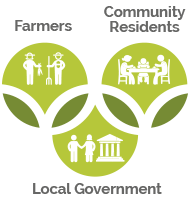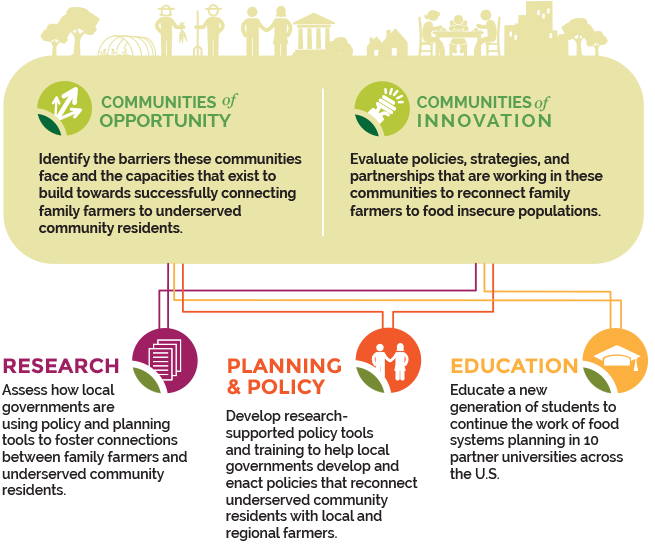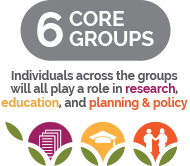The overarching goal of this partnership is to enhance community food security while ensuring sustainable and economically viable agriculture and food production. This requires building the capacity of local governments to remove public policy barriers and deploy innovative public policy tools.
Background and Objectives


About Capacities
Building the capacity of local governments to improve community food systems to benefit small and mid-sized farmers and underserved community residents.
Food is integral to human sustenance. Yet many Americans are food insecure, struggling to gain access to healthful, affordable and culturally preferred foods. Many farmers and ranchers are struggling to keep their operations viable. This project aims to transform these challenges into opportunities for food producers and communities. We identify innovations in local and regional public policy that strengthen community food systems in order to better support underserved residents and farmers, especially farmers operating small and mid-sized farms. The project builds the capacity of local governments and their partners to create, implement and sustain food system plans and policies that simultaneously promote access to healthy, affordable and culturally acceptable food and foster a viable agricultural sector in their communities.
Research, Education and Planning and Policy in Communities
Growing Food Connections team coordinates and integrates Research, Education and Planning & Policy activities to build a stronger community food system from the ground up. We do this in partnership with individuals and organizations across the research, education, and policy landscape. Please email us to find out how you might partner with us at: growingfoodconnections@ap.buffalo.edu.
![]() Growing Food Connections Overview
Growing Food Connections Overview

 Local governments can strengthen food systems by developing and implementing food systems plans and related public policies to support regional agriculture, community residents and the markets, delivery systems and infrastructure needed to connect them. Community food systems planning research focuses on improving access to healthy food for all residents, especially those that are underserved by the global food system. Working in all regions of the US, and across urban and rural places, the Growing Food Connections partnership builds the capacity of local governments to deploy evidence-based public policy tools.
Local governments can strengthen food systems by developing and implementing food systems plans and related public policies to support regional agriculture, community residents and the markets, delivery systems and infrastructure needed to connect them. Community food systems planning research focuses on improving access to healthy food for all residents, especially those that are underserved by the global food system. Working in all regions of the US, and across urban and rural places, the Growing Food Connections partnership builds the capacity of local governments to deploy evidence-based public policy tools.
To prepare the next generation of leaders in food systems planning, Growing Food Connections gathers, develops and distributes curricular materials on food systems planning to academic and professional partners. The partnership supports graduate student education and research in food systems at the master’s and doctoral levels.
To build the capacity of Communities of Opportunity to promote food access and economically viable agriculture and food production, Growing Food Connections:
- Provides local government officials and other key stakeholders with knowledge and related resources to better plan for food and agriculture.
- Assists Communities of Opportunity in the creation of partnerships and a policy framework needed to sustain healthy food and agriculture system efforts over time.
- Fosters the development and financing of infrastructure necessary to add value to agricultural production and ensure access to healthy food.
- Connects Communities of Opportunity with Communities of Innovation on how to leverage public and private resources to create healthy, sustainable community-based food systems.
A Diverse Team to Grow Food Connections
 The Partners and Team behind the Growing Food Connections project include 6 Core Groups:
The Partners and Team behind the Growing Food Connections project include 6 Core Groups:
- Investigators
- National Advisory Committee Members
- Food System Experts
- Planning Professionals
- Representatives of Communities of Innovation
- Representatives of Communities of Opportunity


